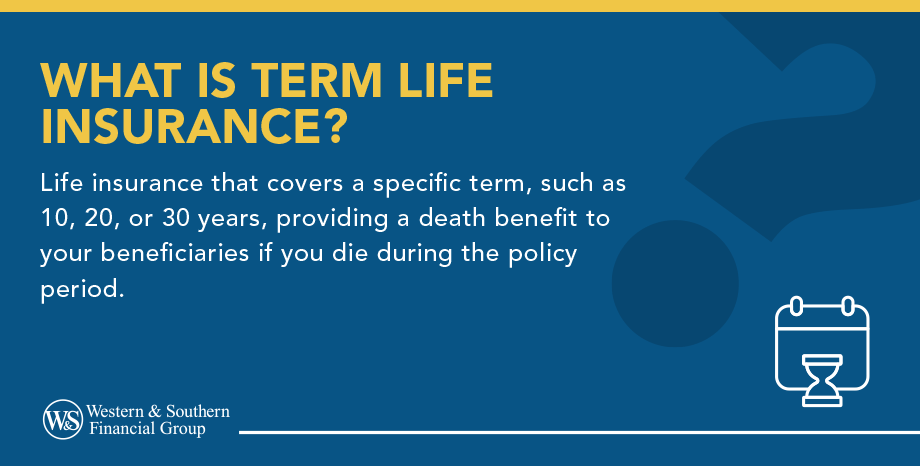Video Transcript
Today we're unpacking another crucial aspect of financial planning called term life insurance. This type of insurance is popular, affordable, and easier to understand than you might think.
Whether you're a young adult, a parent, or somewhere in between, knowing about term life insurance can play a key role in your financial strategy.
You choose the term — it could be 10, 20, or even 30 years. During this term, you pay a premium, usually monthly or annually. If you pass away during this term, the insurance company pays a death benefit to your beneficiaries.
Term life insurance is budget friendly and typically less expensive than permanent life insurance because it doesn't build cash value and only covers you for a specific period.
Consider what financial responsibilities you need to cover like a mortgage, children's education, or other debts. You'll want your term to cover these bligations fully or until your financial obligations decrease.
If term life insurance sounds like a good fit for you, contact a financial professional to help you choose the term and coverage amount that aligns with your needs and budget.
Key Takeaways
- Term life insurance offers cost-effective coverage for a defined duration.
- It offers high death benefits at lower premiums compared to permanent policies.
- Ideal for temporary needs like mortgage protection or income replacement.
- Policies are customizable with various term lengths and coverage amounts.
- No cash value accumulation, focused solely on death benefit protection.
Term Life Insurance Defined
Term life insurance is a type of life insurance policy that helps provide coverage for a specific period, known as the "term." If the insured person passes away during this term, the policy pays the beneficiaries a death benefit in cash. This type of life insurance is often chosen for its affordability when compared to permanent life insurance options. It is ideal for those who need coverage for a defined period, such as while raising children or paying off a mortgage.A term life insurance policy is a contract outlining the life coverage, premiums, beneficiaries, renewal clause, and policy provisions for the death benefit between the insured and the insurer.
How Does Term Life Insurance Work?
Term life insurance policies helps provide coverage for a specific duration, known as the term length. Here's a step-by-step explanation of how it functions:
- Selecting a Policy: You choose a term length that is typically available in various lengths and periods of time (e.g., 10, 15, 20, or 30 years) and the coverage amount (the death benefit) you want.
- Paying Premiums: You pay regular premiums, typically monthly premium or annual. These premiums are generally fixed and remain the same throughout the term of the policy.
- Coverage Period: Your policy remains active and helps provide coverage for the entire term as long as you continue to pay the premiums.
- Death Benefit: If you pass away within the policy's term, the insurance company pays your beneficiaries a cash benefit. This payment is generally tax-free and helps provide access to funds that can be used for various expenses, such as funeral costs, debts, or living expenses.
- End of Term: When the term ends, you have a few options:
- Renew: Some policies offer a renewal option, allowing you to extend the coverage for another term. However, premiums may increase based on your age at renewal.
- Convert: Some policies offer the option to convert to permanent life insurance without a medical exam, offering lifelong coverage.
- Let It Expire: If you do nothing, the policy expires, and no benefits are paid. You won't receive any money back or have any coverage beyond the term.
- No Cash Value: Unlike permanent life policies, term life insurance does not accumulate cash value or offer investment components. It's designed to help provide a death benefit if the insured passes away during the coverage period.
Term life insurance coverage is valued for its simplicity and cost-effectiveness, making it a practical choice for those seeking straightforward coverage for a defined period.
Find out how term life insurance can help protect your family's financial future. Get a Free Life Insurance Quote
What Are the Types of Term Life Insurance?
Term life insurance comes in several common product types, each designed to meet different needs and preferences. Here are the main types:
Level Term Life Insurance
- Description: The death benefit and premiums remain constant throughout the policy's term.
- Use Case: A level term policy is perfect for those seeking stable premiums and a guaranteed payout. It is often used for mortgage protection or to support dependents financially.
Decreasing Term Life Insurance
- Description: The death benefit decreases over time while the premiums remain level or decrease.
- Use Case: This common type of policy is often used to cover loans or mortgages, where the outstanding balance reduces over time. It helps provide a payout that aligns with the decreasing financial obligation.
Increasing Term Life Insurance
- Description: The death benefit increases periodically, usually in line with inflation or at a predetermined rate, while premiums may also increase.
- Use Case: This type of term policy is suitable for those who want their coverage to grow with inflation or increasing future needs, such as growing family expenses.
Renewable Term Life Insurance
- Description: The policy can be renewed at the end of the term without new evidence of insurability (e.g., medical exam), although premiums may increase based on the insured's age.
- Use Case: Offers flexibility if you need to extend coverage but might face higher premiums.
Convertible Term Life Insurance
- Description: Allows you to convert the term policy to a permanent life insurance policy (such as whole life or universal life insurance) without a medical exam.
- Use Case: This type of policy allows you to transition to permanent coverage later on, which can be beneficial if your insurance needs to change or you want lifelong coverage.
Return of Premium Term Life Insurance
- Description: Helps provide a refund of premiums paid if the insured survives the term of the policy. Premiums are generally higher than standard term policies.
- Use Case: This form of life insurance is ideal for those who want to get their premiums back if they don't need the coverage, though it is more expensive.
Each type of term life insurance offers distinct features that cater to different needs, making it essential to evaluate your personal circumstances and long-term goals when choosing the right policy.
Pros: Benefits of Term Life Insurance Policies
Term life insurance offers several benefits, making it a favored choice for many seeking coverage. Here are some of the key advantages:
- Affordability: Term life insurance typically has lower premiums than permanent life insurance products because it covers a specific period and doesn't build cash value. More affordable premiums make it accessible for a broader range of people, allowing them to help secure significant coverage at a lower cost.
- Simplicity: Term life insurance is straightforward to understand. It helps provide a death benefit if the insured passes away during the term, without the complexity of investment components or cash value accumulation. The simplicity of term life insurance makes it easier for individuals to make informed decisions and manage their policies.
- Flexible Coverage Options: Policies are available in various term lengths (e.g., 10, 20, or 30 years) and coverage amounts, allowing individuals to choose a policy that aligns with their specific needs. Flexibility in term lengths and coverage amounts helps tailor the insurance to match financial goals and obligations, such as covering a mortgage or supporting dependents.
- Predictable Premiums: Many policies offer fixed premiums throughout the term, meaning your life premium remains consistent. Predictable premiums make budgeting easier and prevent unexpected increases in insurance costs.
- Coverage for Specific Needs: Term life insurance can cover specific financial responsibilities, such as a mortgage, education expenses, or other debts, which may be reduced over time. Helps provide targeted protection during crucial periods, ensuring that financial responsibilities are covered if the insured passes away.
- Renewability and Convertibility Options: Certain term policies offer renewal or conversion to permanent insurance at the end of the term, providing flexibility to extend coverage or transition to permanent insurance without needing a medical exam.
- No Cash Value: Unlike permanent life insurance, term life policies do not accumulate cash value. This simplicity means that the entire premium payment goes towards the life insurance death benefit cost, keeping costs lower and avoiding investment complexities.
Term life insurance is ideal for those seeking cost-effective, straightforward coverage to help protect loved ones or fulfill financial obligations during a specific period.


Cons: Drawbacks of Term Life Insurance Policies
Term life insurance policies offer numerous benefits but also have certain drawbacks. Here are some of the key disadvantages:
- Temporary Coverage: Term life insurance covers a specific period (e.g., 10, 20, or 30 years). Once the term ends, the policy expires, and coverage stops. If you outlive the policy term, your beneficiaries do not receive any death benefit, potentially leaving you without coverage when you may still need it.
- No Cash Value: Unlike permanent life insurance, term life insurance does not accumulate cash value or serve as an investment. You cannot borrow against the policy or use it as a savings vehicle, limiting its financial utility beyond providing a death benefit.
- Increasing Premiums Upon Renewal: If you choose to renew your term life policy after the initial term ends, the premiums are typically recalculated based on your current age and health. Renewal premiums can be significantly higher, making it costly to maintain coverage as you age or if your health deteriorates.
- Limited Flexibility: Term life insurance is relatively inflexible compared to permanent policies, which offer various riders and options for adjusting coverage. Limited customization options mean term life insurance may not fully meet evolving financial needs.
- No Return on Premiums: Standard term life insurance policies do not return premiums if the policyholder outlives the term, unlike some permanent policies that build cash value or offer a return of premium option.
- Health-Based Eligibility: The cost and availability of term life insurance are primarily based on your health and age at the time of application. Individuals with significant health issues may face higher premiums or be denied coverage altogether.
- Potential for Inadequate Coverage: Because term life insurance is intended to cover specific periods and financial obligations, it may not address long-term or permanent needs. If your financial situation changes or you develop long-term obligations, a term policy might not provide sufficient coverage, necessitating the purchase of additional or different types of insurance later.
- Policy Expiry Risk: The policyholder risks outliving the term and facing difficulties obtaining new coverage due to age or health, leaving them vulnerable when they still need financial protection.
While term life insurance is an excellent option for many due to its affordability and simplicity, these drawbacks highlight the importance of carefully considering your long-term financial needs and exploring all available insurance options.
Who Should Consider Term Life Insurance?
Term life insurance is suitable for many individuals and families, particularly those seeking affordable and straightforward coverage for a specific period. Here are some groups that should consider term life insurance:
- Young Families: Young families often have significant financial responsibilities, such as raising children, paying a mortgage, and covering daily living expenses. Term policies help ensure dependents are financially protected if the policyholder dies unexpectedly, covering immediate needs like childcare, education costs, and household bills.
- Homeowners with a Mortgage: Individuals with outstanding mortgage debt need to help ensure that their family can continue living in their home if they pass away. A term life insurance policy can match the length of the mortgage, providing coverage that ensures the mortgage can be paid off, preventing financial strain or loss of the home.
- Primary Breadwinners: Those who are the main income earners in their household need to help ensure their income is replaced if they pass away. Term life insurance can replace lost income, helping to maintain the family's standard of living and cover essential expenses such as utilities, groceries, and healthcare.
- Individuals with Debt: People with significant debts, including student loans, car loans, or credit card debt, must help ensure these obligations are not passed on to their families. Term life insurance can cover these debts, preventing financial burdens on survivors and ensuring debts are paid off.
- Business Owners: Business owners need to help ensure their business continuity in the event of their death, especially if they have business loans or partners dependent on their role. Term life insurance can fund buy-sell agreements, pay off business loans, and help provide capital to keep the business operational, protecting the business and the family.
- Young Adults: Young adults in good health can lock in low premiums for future protection, even if they don't have immediate dependents. Purchasing term life insurance at a young age helps ensure affordable coverage that can be useful later when financial responsibilities increase.
- Individuals Seeking Affordable Coverage: People looking for life insurance but who are on a budget may not be able to afford the higher premiums of permanent life insurance. Term life insurance offers high coverage at lower premiums, providing essential protection without straining finances.
- Temporary Coverage Needs: People need life insurance for a specific period, such as until their children are financially independent or until retirement. Term life insurance is ideal for temporary coverage, helping provide security during key financial phases.
Term life insurance is a practical choice for those who need significant coverage at an affordable price, mainly when the need for insurance is linked to specific financial obligations or life stages.
How to Choose the Right Term Life Insurance Policy
Choosing the proper term life insurance policy involves evaluating your financial needs, comparing different types of term policies, and understanding the terms and conditions. Here are steps to help you make an informed decision:
Determine Your Coverage Needs:
- Evaluate Financial Obligations: Calculate the amount needed to cover debts (mortgage, loans), future expenses (college tuition, daily living expenses), and income replacement for your family.
- Consider Long-Term Goals: Think about future financial goals, such as funding retirement for your spouse or leaving an inheritance.
Select the Appropriate Term Length:
- Match Term to Financial Responsibilities: Choose a term that aligns with the length of your financial obligations (e.g., a 20-year term to cover a 20-year mortgage).
- Consider Life Stages: Factor in life stages, such as until your children are financially independent or until you retire.
Compare Policies from Different Insurers:
- Research Multiple Companies: Obtain quotes from reputable insurance companies to compare premiums and coverage options.
- Check Financial Strength: Helps ensure the life insurance company's financial stability by checking ratings from agencies like A.M. Best, Moody's, or Standard & Poor's.
Understand Policy Features:
- Renewability: Look for policies that offer the option to renew at the end of the term, though premiums may increase.
- Convertibility: Check if the policy allows conversion to a permanent policy without a medical exam, providing flexibility for future needs.
Assess Premium Costs:
- Budget Considerations: Helps ensure the premiums fit your budget while providing the necessary coverage.
- Fixed vs. Increasing Premiums: Decide whether you prefer fixed premiums (level term policy) for predictability or if you're comfortable with premiums that may increase.
Examine Exclusions and Limitations:
- Policy Exclusions: Understand what is not covered by the policy, such as specific causes of death or certain high-risk activities.
- Claim Settlement Ratio: Research the insurer's claim settlement ratio to gauge how reliably they pay out claims.
Review Additional Riders:
- Customize Your Policy: Consider adding riders (additional coverage options) such as a waiver of premium, accidental death benefit, or critical illness rider for additional benefits and enhanced protection.
Read the Fine Print:
- Policy Terms: Carefully read and understand the policy's terms and conditions, including any clauses about policy renewal, conversion, and premium increases.
Seek Professional Advice:
- Financial Planner Consultation: Consult with a certified financial planner or insurance advisor to help ensure the policy aligns with your overall financial plan and goals.
Evaluate Customer Service:
- Customer Reviews: Look into customer reviews and ratings to assess the insurer's reputation for service and support.
- Support Availability: Helps ensure the insurer provides policyholders adequate customer service and support.
By following these steps, you can choose a term life insurance policy that effectively meets your needs, helps provide adequate coverage for your dependents, and fits within your financial plan.
Conclusion
If you need more help understanding how to buy life insurance, the types of life insurance, or the needs of your family members, consider contacting an experienced life insurance agent. They can explain these topics in more detail and help ensure your coverage meets your needs.
Explore different term life insurance policies to find the best fit for your needs. Get a Free Life Insurance Quote
Frequently Asked Questions
Which is better, term insurance or whole life insurance?
Understanding the difference between term and whole life insurance is key to determining the best coverage for your circumstances.
- Term life insurance premiums are usually cheaper and ideal for temporary coverage, whereas whole life insurance is more expensive but offers lifetime coverage and a cash value component.
- Term policies are ideal for temporary financial obligations like mortgages or child-rearing, while whole life policies are better for long-term financial planning and estate considerations.
Can you convert a term policy to a whole life policy?
Yes, many term life insurance policies offer the option to convert to a whole life policy. This conversion extends your fixed-term coverage to lifelong protection without a medical exam, offering fixed premiums and a potentially growing cash value.
Before converting, evaluate your budget, financial situation, and long-term goals to determine if this option suits you.
Can I cash out or borrow from term life insurance?
No, you cannot cash out or borrow from a term life insurance policy because it does not accumulate cash value. Term life insurance offers a death benefit for a specific period without any savings or investment component. If you need access to cash value or borrowing options, you would need to consider a permanent life insurance policy instead.
Do you get money back if you outlive term life insurance?
You do not get money back if you outlive a standard term life insurance policy, as it does not have a cash value component. The policy expires, and coverage ends without any return of premiums. However, some policies offer a return of premium rider, which refunds premiums paid if you outlive the term, but these come with higher costs.














